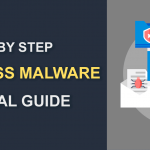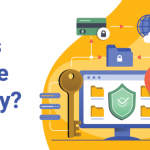What is Website Security?
August 11, 2022 | By Admin

What is Website Security Risks
Website security refers to any application or action taken to prevent the exploitation of websites in any manner or to make sure that website data is not exposed to cybercriminals. An efficient website security tool will be able to scan your websites for possible security-related issues such as redirect hacks, pharmaceutical hacks, Trojan viruses, etc.
Any website is prone to security risks. This is the same even in the case of networks to which web servers are connected. Website security protects your website from a wide range of attacks that include:
Website Security Protects your Website:
Vulnerability exploits: Cybercriminals can access a website and the data stored on it by exploiting weak areas on a website.
DDoS attacks: These attacks can completely crash or slow your website, making it inaccessible to visitors.
Blacklisting: Your website could get removed from search engine results and flagged with a warning, turning visitors away if malware gets detected by search engines.
Malware: Also known as malicious software, malware is a very common threat used for distributing spam, permitting cybercriminals to access your website, stealing sensitive customer data, and more.
Defacement: This website attack replaces your website's content with malicious content developed by a cybercriminal.
SQL injection: This type of attack allows the execution of malicious SQL statements. Attackers use SQL Injection vulnerabilities to avoid application security measures. Criminals use this type of website attack to attain unauthorized access to sensitive information that could include personal data, intellectual property, trade secrets, customer information, and more.
Cross-site scripting (XSS): This is a client-side code injection attack that executes malicious scripts in a victim's web browser by including malicious code in a genuine web application or web page. The actual attack takes place when the victim visits the web application or web page that executes the malicious code. The web application or web page thus becomes a vehicle used for delivering the malicious script to the user's browser.
How to Detect Web Application Security Threats
Websites and web applications need the intelligence and flexibility of a scalable network to combat the latest attacks no matter how big they are. It is important to guarantee that performance is never sacrificed for security and that systems have a simple setup and configuration, thus preventing configuration errors capable of introducing security vulnerabilities.There are three types of automated web security defense measures:
Web application firewalls (WAFs): WAFs are considered to be the first line of defense against external attacks. WAFs can be very easily implemented. After the implementation process, a WAF will be able to send all your traffic via the provider you choose, or via your in-house appliance. Typically, WAFs implement a blacklist of different types of requests not permitted to hit your website. Hence, if an attacker ever attempts to send a vulnerability that is matched by this blacklist, the packet will be dropped before it hits your servers.
Reactive scanning solutions: Scanning is a line of defense against external attacks. Scanning tools are capable of crawling your website and looking out for any malware. You will quickly get alerted if there are any risks so that you can patch up any holes that have been detected by hackers to alleviate any further loss.
Proactive scanning solutions: This type of scanning solution will help you in catching vulnerabilities even before you are attacked. This solution will examine all web pages and files that it finds and build a structure for the entire website. The website vulnerability scanner will then execute automated checks against security vulnerabilities by launching a series of common web attacks and examining the results for vulnerabilities. Performing a web application vulnerability assessment is thus the best way to detect web application security threats.
Why is Website Security a Growing Necessity?
Your website could get vandalized and all your hard work can instantly get destroyed, resulting in a loss of revenue and visitors. This is the impact cybercrime can have on a vulnerable website. Cybercrime is a huge business these days and cybercriminals are vigorously working towards identifying vulnerable sites no matter how big or small the sites are and then stealing all essential data for cash malicious purposes. Protecting your website is thus a growing necessity because cyberattacks are generally caused by malware - software specifically intended for infecting your website.
Your business can thrive when you employ proper website security measures capable of protecting your website from various sophisticated cyber threats. Thus, website security is needed for the following reasons:
What do I need to Secure My Website?
To protect your reputation: Individuals visiting your website may not come back to it if they pick up viruses or are scammed by a phishing hack that was put on your website by some ill-intentioned person. This will indeed ruin your website's reputation and traffic.
To protect customer data: A Security breach is the worst type of attack that can happen to an organization. In a security breach, a customers' private data and other essential details like names, street addresses, email addresses, passwords, and credit card details can get leaked. Regaining a customer's trust becomes a very difficult task after a security breach. This is true in the case of big and small companies. Such situations can thus be prevented when you employ proper website security precautions.
To keep your search engine rankings high: The internet is constantly being scanned for risky websites by search engines and virus scan software. If your website is hosting a phishing scam, virus, or Trojan, even if you are not aware of it, the search engines or virus scan software will see it. Your search engine ranking will rapidly drop. This is why you need website security measures that will help in protecting your Google rankings.
Key Reasons Why Websites Get Hacked
A hacked website is never a good thing. Business owners find it extremely frustrating when their websites get hacked. A hacked website means downtime – this refers to the time when your customers find it difficult to access your website when they want to buy your product. Downtime here also refers to the time during which your team will have to act in order to get things up and running all over again. Website getting hacked can also mean the loss of vital data or the compromise of private customer data.
There are many reasons why websites get hacked. Hackers target your website in order to:
Steal intellectual property: Several organizations use websites to store intellectual property. This highlights the fact that websites can contain vendor portals, customer portals, secret company documents, top-secret military and government plans, or sales leads. The ultimate motive here is to secure data. A security breach in intellectual property may damage the reputation, and compromise vendor and customer data, eventually leading to a loss in business.
Steal sensitive data: Some websites collect, store, process, or use confidential data such as account credentials, payment cards, health records or personally identifiable information. Websites using sensitive data should go through a penetration test to detect vulnerabilities and provide a remedy in order to lower the occurrence of a data breach.
Learn: Hackers constantly try to enhance their skills by discovering new vulnerabilities, testing the latest exploits in the wild or practicing newly learned skills in a real-world environment. Attackers mostly target smaller companies as they often have very less or even no security, thus allowing attackers to test out the most recent exploits and develop new hacking skills.
Host and deliver malware: After compromising a website, the hacker can use it to execute attacks against other organizations and internet users. Hackers target your website to host ransomware and crypto mining which can spread on the internet. It is also possible to use a compromised web server in hacking campaigns.

Most Common Web Security Vulnerabilities
In today's digital age, websites are becoming prone to security breaches because of the increasing number of cybercrimes. Web security is extremely vital, especially for web applications or websites dealing with confidential, or protected information. New security methods are developing in order to match the wide range of vulnerabilities that come into existence.
Insecure Direct Object References: This web security vulnerability takes place when a web application exposes a reference to an internal implementation object. Internal implementation objects comprise database records, files, database keys, and directories. After an application exposes a reference to one of these objects in a URL, hackers will be able to manipulate it in order to gain access to a user's private details.
Security Misconfiguration: Security misconfiguration encloses different vulnerabilities centered on a lack of attention to the web application configuration or a lack of maintenance. It is essential to define a secure configuration and deploy it for the application, application server, web server, frameworks, platform, and database server. Security misconfiguration allows hackers to access private data or features, resulting in a complete system compromise.
SQL Injections: This is a type of website security vulnerability that involves malicious SQL statements or application codes that get injected into user input fields. This procedure allows attackers to obtain access to the website's backend database or corrupt database content.
Cross Site Scripting (XSS): XSS happens when lines of malicious JavaScript code get injected into a webpage in order to target the website's users, manipulating client-side scripts. These scripts are capable of hijacking user sessions via a website's search bar or comments. This results in ruining the website and users can also get redirected to other malicious websites that pose as normal-looking pages capable of stealing information.
Distributed Denial of Service (DDoS) attack: A DDoS attack occurs when a website server receives too much traffic or requests that overwhelm or overload the system. The website security vulnerabilities are fake traffic from botnets (attacker-controlled computers). A botnet refers to several internet-connected devices running one or more bots.
Cross-Site Request Forgery (CSRF): CSRF is a malicious attack in which users get tricked into carrying out an action that was not intended by them. A request is sent by a third-party website to a web application that a user is already authenticated against. The attacker will then be able to access the functionality through the victim's browser which has been already authenticated. The common targets include web applications like social media online banking, web interfaces for network devices, and in-browser email clients.
How to Protect Your Website from Hackers?
There are several reasons why hackers target websites. With the growth in technology, hackers are also coming up with sophisticated hacking techniques for websites. Very often, hackers steal data in order to take over your personal identity and then use it for something else like taking a loan, transferring money, etc. This spread of hacking attacks also highlights the need for more sophisticated website protection measures.
Discussed below are a few key tips to help keep protect your website and help it be safe online:
Error Messages:To protect your website, you will have to be extremely careful about how much information you disclose from error messages. If an attacker attempts a brute force attack to get a password or username and if the error message indicates which part of the query is incorrect, then the attacker will be able to very easily determine which part is incorrect and gain entry off other attempts.
Use parameterized queries: Many websites fall victims to SQL injections. This type of attack occurs if you have a web form or URL parameter that permits outside users to supply data. If the parameters of the field are left completely open, then someone will insert code into them and this code will permit hackers to access your database. It is hence essential that you protect your website from SQL injections because of the amount of sensitive customer data that can be stored in your database.
Make sure your passwords are secure: To maintain the security of your accounts, always make sure to have strong passwords that are a combination of a minimum of eight characters including special characters, numerals, and upper and middle case.
Server-side validation/ form validation: Validation is always considered to be best for protecting your website from hackers. Validation is best when done both on the browser side and the server side. The browser will be able to catch simple failures like empty mandatory fields, but these can be bypassed, and it should be guaranteed that these validations are checked including the deeper server-side validations, as failure to do this could result in the injection of malicious or scripted code into the database.
Use firewalls to protect unauthorized access: Firewalls are hardware or software that blocks unauthorized connections by letting through only permitted forms of traffic. Web application firewalls (WAFs) are a common security control measure used for protecting web systems against malware infections, zero-day exploits, impersonation, and several other unknown and known vulnerabilities and threats.
Related Resource
- Cheap Content Delivery Network
- CDN Plans and Pricing
- Best CDN
- Pay as You Go CDN
- CDN
- Free CDN
- Website Malware Scanner
- Website Vulnerability Scanner
- Website Backup
- Web Application Protection
- DDoS Protection
- Website Security Protection
- Hacker Protection
- Free Website Monitoring
- How to Identify a Safe Website
- How to Run a Virus Scan on a Website
- How to See If a Website is Safe
- Web Security Check
- DDoS Attack Protection
- How to Secure your Website
- Vulnerability Assessment
- Website Status
- WordPress Security
- What is Hashing

 (21 votes, average: 4.43 out of 5, rated)
(21 votes, average: 4.43 out of 5, rated)








